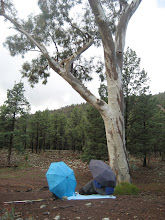As a temporary resident of Australia, we pay taxes, but will not be joining the millions of Australians Citizens who must visit the polls tomorrow. Voting in Australia is compulsory for citizens over 18, and those who do not vote face a fine.
To be honest, I am not really sure I completely understand the election process here Down Under. My ignorance came to light back in late June when at a pilates class I was asked about my opinion of the New Prime Minister. The confusion on my face said it all, and the woman next to me shook her head with disgust and said "You don't listen to the radio do you?" The conversation didn't continue for a lack of interest, but because the roll-downs had begun.
After class, as I walked home, I scanned the headlines as I passed the News Stands. Sure enough, not only did Australia have a new Prime Minister, but it was a she. Wow, how had I missed the political campaigning? After all, I couldn't imagine a women fighting for a power position without a lot of hoopla.
A quick internet search when I got home cleared up my befuddlement--there had been no election. Less than 24 hours earlier the new Prime Minister, Julia Gillard, had been a deputy to Kevin Rudd. Then, during the wee hours of June 24th, P.M. Rudd lost the support of his party and he gracefully stepped aside and handed the reigns over to his deputy. With my new understanding of the situation I didn't feel like such and idiot.
My education about Australian Politics did not end there, and it soon became clear that elections were in the near future. It turns out that even though elections are held at least once every 3 years, it is the Prime Minister who advises the Governor-General to call an election at any time. On July 17th, Prime Minister Gillard called for an election to be held on August 21st. So it was time for me to broaden my understanding on Australian Politics.
I already knew that the politics in this country take place within the framework of parliamentary democracy, and that that the country is a federation and a constitutional monarchy. From my recently acquired knowledge I realized that the Prime Minster is not directly elected by the Australian people, but is chosen by the political party that holds power. So tomorrow the public will not be voting for a specific person, but rather for a political party. It is interesting to note that rather than casting one single vote, preferential voting is used in this country. That means that voters number candidates on the ballot paper in a rank order of choice. This is unique in that if your first choice candidate is not elected and no candidate receives half the vote, your vote may be re-examined for your next preference. This system is used to ensure that the most preferred candidate is elected. It is this system that allows minor parties and independent candidates to access the Senate in a country that has a de facto two-party system between the Australian Labor Party and a coalition of the Liberal Party of Australia, the National Party of Australia and the Country Liberal Party.
Over the last month or so I have gained a better understanding of the local political system. I am still a long way from fully understanding it, but I am looking forward to seeing preferential voting in action.
Friday, August 20, 2010
Subscribe to:
Post Comments (Atom)






No comments:
Post a Comment